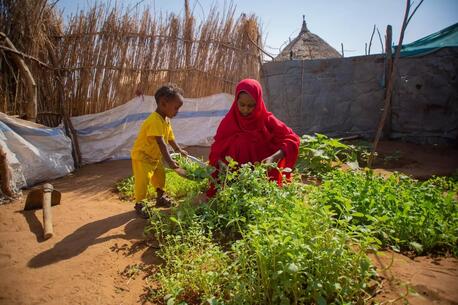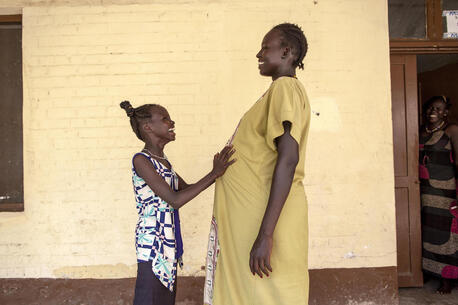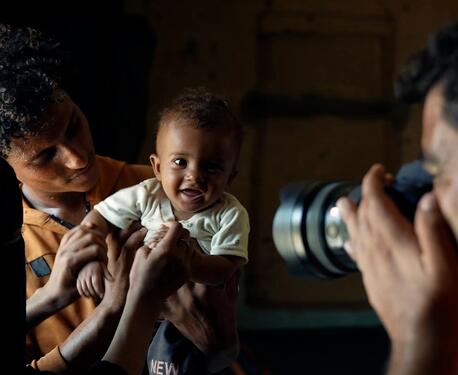Going to School to Learn — and Eat
At Little Star Preschool in rural Sri Lanka, young students are thriving thanks to a UNICEF-supported program that provides them with a nutritious midday meal.
It's lunch time at Little Star Preschool, a one-room classroom in the middle of a coconut farm in rural Deraniyagala, Kegalle district, Sabaragamuwa province, Sri Lanka. Close to two dozen boys and girls stand facing the teacher, hands clasped, and repeat after her:
"Thank you for the food."
The mothers who are there to volunteer carry hot and cold dishes in from the back porch — rice with vegetables, dal, slices of orange and pineapple — and start piling the food onto plates to give to the children, who are now seated at kid-sized tables. It is part of the daily routine here, made possible with support from UNICEF and partners.
The community around Little Star is among the hardest hit by the country's economic crisis and its ripple effects, like high inflation.
"We have had to stay agile in our work for children in Sri Lanka, to make sure the most vulnerable are cushioned from the worst effects of poverty," explains Bismarck Swangin, UNICEF Sri Lanka's Chief of Communication, Advocacy and Partnerships. “Whether it’s an economic crisis, a war, or a natural disaster, the impact on vulnerable children is always the same: malnutrition rates soar, and children miss out on education."
UNICEF’s mission in Sri Lanka is to make sure that doesn’t happen. Supporting a preschool meal program is one way to do that.
Benefits of providing school meals go beyond nutrition
Rewathi, 30, has a 4-year-old son, Sageeth, and is five months pregnant with her second child. Usually she stays home on school days to do chores, such as collecting firewood. With fuel prices prohibitively steep, her husband's tuk-tuk business has stalled, and cooking with gas is a luxury the family can no longer afford. At times there has been nothing for the family to eat.
Knowing Sageeth will get a complete midday meal at school Mondays through Fridays helps a lot, she says. "They provide fruits, meat, fish, eggs, and nutritious foods like yogurt and bananas, so we are very happy."
Today there are more mothers than usually helping out, because today there are visitors: two representatives from the UNICEF Sri Lanka country office and a videographer, writer and program specialist from UNICEF USA who have come from New York to see firsthand how the program is helping children and families.
Rewathi tells the visitors she is grateful for the meal, often the one square one her child will get in a day. She says she is grateful for how the program eases pressure from the family's finances, and how it lightens her work load at home. The best part, though, is that her son is more active and seems to be thriving.
“Since we enrolled our son at this preschool, we can see a big difference," Rewathi says.
Darshani Kamaldas, mother of Dilakshana, 5, has also noticed changes in her daughter that she attributes to the daily meal. "Her weight is increasing, her height is increasing, her activities are increasing," Darshani says as the kids run and jump around a few feet away. "She eats well here at mealtime, more than what she eats at home."
When Sri Lanka's economic crisis hit, UNICEF stepped in to help sustain key programs for children
Up until recently, there had been a government-backed feeding program for preschool-age children in vulnerable communities. But then the economic crisis hit, forcing budget cuts, and the program was sharply curtailed. Many schools had to reduce the quantity and quality of the food served or stop serving meals altogether.
UNICEF and partners stepped in to pick up the slack. That response, Swangin says, is only partly about mitigating the risks of child malnutrition. It also helps reinforce the role of school as a stabilizing, nurturing force in a child’s life.
At preschools that serve meals, student attendance is up and kids are more engaged
With funding support from the Bill & Melinda Gates Foundation, and in collaboration with early childhood development authorities, the preschool meal program reached over 18,000 children in 652 preschools across Uva, Central and Sabaragamuwa provinces, areas where poverty levels are among the highest in the country.
Authorities at participating schools have reported that as a result, student attendance has improved and the kids are more actively engaged in learning and other classroom activities.
A similar program recently rolled out in Colombo, with similarly positive results, prompting the municipal government to take ownership over the program, with UNICEF continuing to provide technical expertise and other support.
At Little Star, after the children finish eating, it is play time out front on the swings and seesaw, with teachers supervising, while the mother-volunteers tidy up inside.
"The school meal is more than just a bite," Swangin says. "By ensuring that they have a nutritious diet to nurture their bodies and brains, it represents a chance in life for these children — to learn, to develop to their full potential and to become future productive citizens for their country."
UNICEF’s mission in Sri Lanka focuses on strengthening child nutrition, health care services and education, including early childhood development, working with local partners and using community-based approaches. Learn more about UNICEF’s work in Sri Lanka.
Support UNICEF's mission for children. Donate today.


